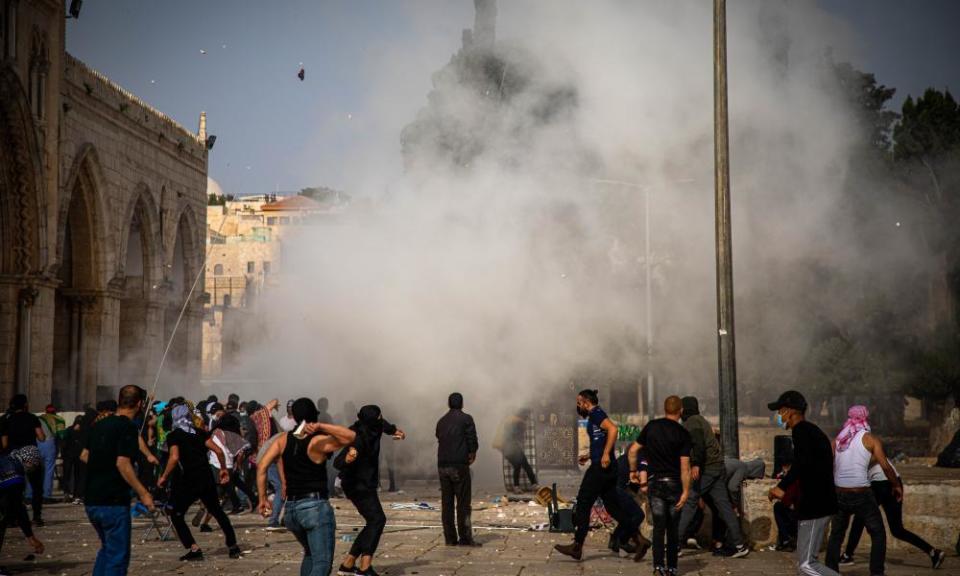What has caused Jerusalem’s worst violence in years?

What is happening in Israel and Palestine?
Jerusalem has experienced its worst unrest in years, with hundreds of Palestinian protesters wounded in clashes with Israeli police. More than 20 people have been killed in Gaza following fighting between militants and Israel, violence has surged into the occupied West Bank and Arab communities inside Israel have held demonstrations.
What has caused the increase in violence?
It all relates to Israel’s half-century military occupation and its ever-deepening grip over Palestinian life. Long-building anger has exploded because a series of events have all converged at once, reaching a crescendo on Monday.
What is the background to those events?
In the wake of steps taken by the Trump administration and Israel to cement the county’s control over the Palestinian territories, hope for a resolution to the decades-old crisis is at a nadir.
A decision by Mahmoud Abbas, the 85-year-old leader of the unpopular semi-autonomous Palestinian Authority, to postpone planned elections has added frustration for Palestinians, whose last parliamentary ballot was in 2006.
Meanwhile, an Israeli election in March further emboldened Israel’s far right, bringing a party of Jewish ultranationalists allied with the prime minister, Benjamin Netanyahu, into parliament.
What has happened since then?
A month ago, the Muslim holy month of Ramadan began, and Palestinians have complained of what they say are unnecessarily severe restrictions by Israeli police, who prevented them from gathering on steps outside the Old City – an unofficial tradition after evening prayers.
Amid rising tensions, there was an increase in communal violence, with videos shared online of street harassment and several attacks between Jews and Palestinians. Events came to a head in late April when hundreds of far-right Israelis marched down city streets chanting “death to Arabs” and confronted Palestinians.
How did it escalate over the past week?
Anger built ahead of an Israeli court ruling, which was due on Monday, on whether authorities would evict dozens of Palestinians from the majority-Arab East Jerusalem neighbourhood of Sheikh Jarrah and give their homes to Jewish settlers.
On the same day, thousands of flag-waving Israeli nationalists were due to march through Muslim neighbourhoods in the Old City in a provocative parade that celebrated Israel’s capture of the city in 1967.
By Monday, the court date had been delayed and the march was rerouted, but by that point, the situation has already spiralled.
What is the history?
Jewish families claim they lost land in Sheikh Jarrah during a war that accompanied Israel’s creation in 1948, a conflict in which hundreds of thousands of Palestinians were also displaced.
Two decades later, Israel captured East Jerusalem from Jordanian forces in the 1967 war and later annexed it. Under Israeli law, Jews who can prove pre-1948 title can claim back their Jerusalem properties. No similar law exists for Palestinians who lost homes in West Jerusalem.
Why is Jerusalem such a flashpoint?
Jerusalem has always been the centre of the Israeli-Palestinian crisis, with its holy sites revered by Jews and Muslims. The Old City’s Western Wall forms part of the holiest site in Judaism – the Temple Mount. It is equally part of the al-Haram al-Sharif, or the Noble Sanctuary, with the Dome of the Rock and al-Aqsa mosque – the third holiest site in Islam – above it.
How does the current violence compare historically?
There has never been a time when there is complete calm in Israel and Palestine, so it is hard to compare episodes of violence. However, the last similar event being pointed to occurred in 2017, when anger over moves by Israel to install metal detectors outside the al-Aqsa mosque compound triggered weeks of bloodshed.

 Yahoo Finance
Yahoo Finance 